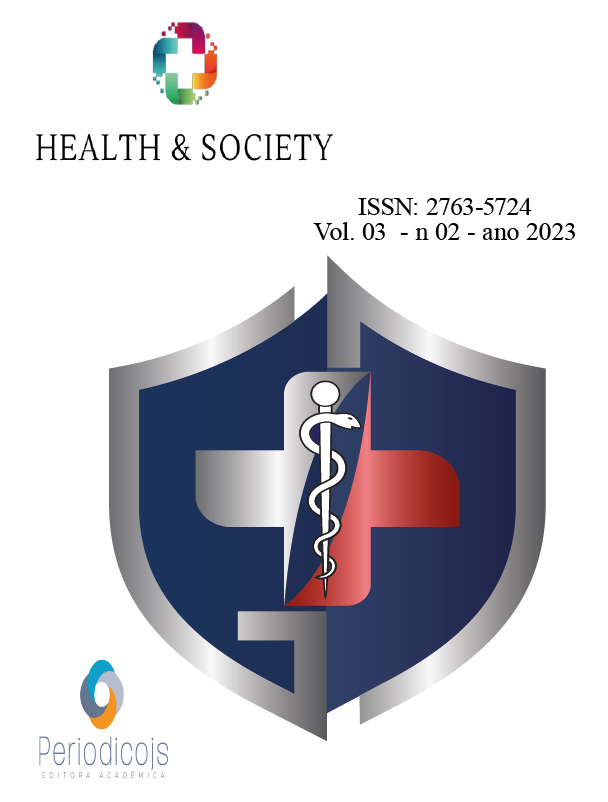Abstract
Self-esteem corresponds to a feeling of personal worth and self-respect, considering a positive or negative evaluation of oneself, while self-concept is attributed a descriptive and evaluative character, the first being related to self-image and the second to self-esteem. In order to build healthy self-esteem, the involvement of family members and school staff is strictly necessary, in order to provide a safe and motivating environment for children and adolescents. Thus, this article has the general objective of understanding the processes of building self-esteem, self-concept and self-image during child development, through the influences of the environment and affective relationships between the people with whom the child lives. The study is a review of narrative literature, through publications/articles in the following databases: Scientific Electronic Library (SCIELO), Latin American and Caribbean Literature on Health Sciences (LILACS) and Virtual Health Library (BVS). Studies have shown the importance of developing a positive self-concept to have a good quality of life. For that, the relationships that the individual establishes in the family, in the school, in his social environment are fundamental for the formation of the self-concept.
References
ALMEIDA, L. R. Ser Professor: um diálogo com Henri Wallon. In: MAHONEY, A. A.; ALMEIDA L. R. (orgs.). A constituição da pessoa na proposta de Henri Wallon. São Paulo: Edições Loyola, 2004.
CONTE, G.; CIASCA, S. M.; CAPELATTO, I. V. Relação entre autoconceito e autocontrole comparados ao desempenho escolar de crianças do ensino fundamental. Revista Psicopedagogia, v. 33, n. 102, p.225-234. 2016.
DEFFENDI, L. T.; SCHELINI, P. W. Relação entre autoestima, nível intelectual geral e metacognição em adolescentes. Psicologia Escolar e Educacional, v. 18, n. 2, p. 313-320. 2014.
FONTELLES, M. J.; SIMÕES, M G.; FARIAS, S. H.; FONTELLES, R. G. S. Metodologia da pesquisa científica: diretrizes para a elaboração de um protocolo de pesquisa. Revista Paraense de Medicina, v. 23, n. 3, 2009.
GUILHARDI, H. J. Auto-estima, autoconfiança e responsabilidade. In: Maria Zilah Brandão, Fátima C. S. Conte e Solange M. B. Mezzaroba (Orgs.). Comportamento Humano: Tudo (ou quase tudo) que você gostaria de saber para viver melhor. Santo André: ESETec. 2002.
HUTZ, C. S. Avaliação em psicologia positiva. Porto Alegre: Artmed. 2014.
HUTZ, C. S.; ZANON, C.; VAZQUEZ, A. C. S. Escala de autoestima de Rosenberg. In Hutz, C. S. (Org). Avaliação em psicologia positiva. Porto Alegre: Artmed. 2014.
MENDES, D. C.; CASTELANO, K. L.; MARTINS, L. M.; ANDRADE, C. C. F. A influência da autoestima no desempenho escolar. Revista Educação em Debate, v. 39, n. 73, p. 9-21. 2017.
MOTTA, P. C.; ROMANI, P. F. A educação socioemocional e suas implicações no contexto escolar: uma revisão de literatura. Psicologia da Educação, v. 49, p. 49-56. 2019.
NASCIMENTO, M. L. B. P. A criança concreta, completa e contextualizada: a psicologia de Henri Wallon. In: ______. CARRARA, Kester. Introdução à psicologia da educação: seis abordagens. São Paulo: Avercamp, 2004.
NEDEL, R.; MATTOS, D. A.; MARIN, A. H. Autoestima e autoconceito infantil, escolaridade parental e sua relação com desempenho escolar no ensino fundamental I. Psicologia e Pesquisa, v. 14, n. 1, p.149-168. 2020.
PAPALIA, E. D.; FELDMAN, R. D. Desenvolvimento Humano. AMGH Editora, 2013.
ROSENBERG, M. Society and the adolescent self-image. Princeton, NJ: University Press.
SACILOTTO, A. L.; ABAID, J. L. W. Autoconceito em adolescentes e suas relações com desempenho escolar e práticas parentais. Barbarói, Santa Cruz do Sul, n. 58, p., jan/jun 2021
SCHAVAREN, L. N.; TONI, C.G. S. A Relação entre as Práticas Educativas Parentais e a Autoestima da Criança. Pensando Famílias, v. 23, n. 2, p. 147-161, dez. 2019.
SCHULTHEISZ. T. S. V.; APRILE, M. R. Autoestima, conceitos correlatos e avaliação. Revista Equilíbrio Corporal e Saúde, v. 5, n. 1, p. 36-48. 2013.
SISTO, F. F.; MARTINELLI, C. S. Escala de Autoconceito Infanto Juvenil (EAC-IJ). São Paulo: Editora Vetor. 2004.
VYGOTSKY, L. S. A formação social da mente. 6. ed. São Paulo: Martins Fontes, 1998.
VYGOTSKY, L. S. Psicologia pedagógica. São Paulo: Martins Fontes, 2001.
WALLON, H. A evolução psicológica da criança. São Paulo: Martins fontes, 1968.
WALLON, H. As Origens do Caráter na Criança. São Paulo: Difusão Européia do Livro. 1971.
WALLON, H. Do ato ao pensamento. Lisboa: Moraes Editores. 1978.
ZACHARIAS, J. Bem-estar docente: um estudo em escolas públicas de Porto Alegre (Tese de Doutorado, Pontifícia Universidade Católica do Rio Grande do Sul, Brasil). 2012.

This work is licensed under a Creative Commons Attribution 4.0 International License.
Copyright (c) 2023 Ivana dos Santos Ribeiro, Itana dos Santos Ribeiro, Thaís Vieira Góis dos Santos





